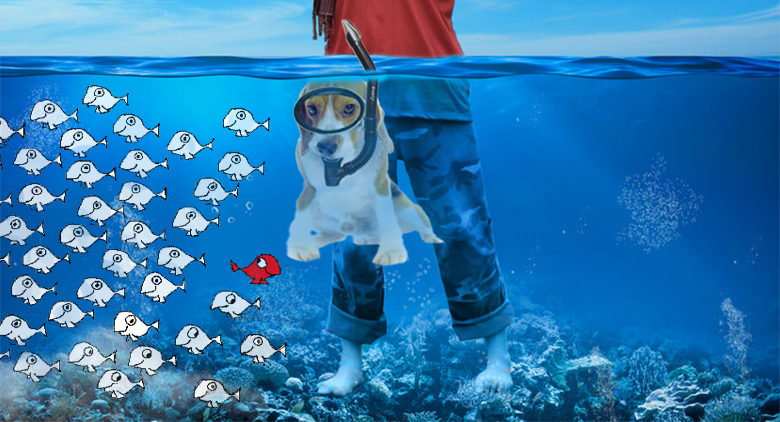 The average person is afraid of criticism.
The average person is afraid of criticism.
But the person who has no fear of criticism is more likely to succeed. This lack of fear is what keeps them from being average.
The average business owner is afraid their ads will be criticized.
Do you want to kill a great ad? Show it to the people you trust.
In the words of my partner Mick Torbay,
“You need to understand something: the committee is not evil. The committee doesn’t want you to fail. The committee has nothing but good intentions. But the committee can’t innovate. More than anything, the committee wants to look good to the rest of the committee. The committee is afraid of looking stupid… The committee can only spot problems, downsides, possible pitfalls… So don’t be surprised that when you present a really, really great idea to a committee, the only thing you’re gonna get is a reason why that idea won’t work, one reason for every member of the committee. The committee will always pull you to the center. The committee will help you avoid risk, but risk and reward are two sides of the same coin. If you avoid risk, then huge success is now out of the question. Are you okay with that?”
Most ads aren’t written to persuade; they’re written not to offend.
But even a weak ad will cause your name to be the first that springs into the public mind if you give it enough repetition. This assumes, of course, that your competitors have equally bland ads.
And frankly, that’s a pretty safe bet.
But repetition costs money.
Do you want to differentiate yourself with memorable, attention-getting ads that will accelerate your repetition by unleashing the persuasive powers of wit, humor, identity, and audacity?
The first step is to find your corporate mission statement, take it outside into the sunlight, lift it high up into the sky, then lay it down on the sidewalk and set it on fire. When it is finished burning, sweep the powdery ashes into the grass. Paper ash is an excellent source of lime and potassium. This will raise the pH and help neutralize the acid in your soil.
You have now put your mission statement to the best possible use.
Just out of curiosity, why did you think you needed to write down all those generic things you believe in? Those things you included – the things you stand for – rarely differentiate you since most of us include, believe in, and stand for the same things: Individuality, Informality, Opportunity, Competition, Efficiency, Progress, and Helping Others. It is what you exclude, or stand against, that defines you. To gain attention and win a following, you must stand against the omission of one of these seven things:
Individuality: individual initiative, individual expression, independence and privacy
Informality: equality, directness, and an open society
Opportunity: ability to change yourself, your business, your country, and your world
Competition: opportunity to win recognition, status, and material rewards
Efficiency: reduce wasted time, effort, and resources
Progress: social, economic, and physical mobility
Helping Others: because we’re all in this together
You may have used different words, but those are the ideas contained in every mission statement, the ultimate expression of committee-think.
You don’t become famous by championing everything.
You become famous by championing one thing.
The client who grew the most in 2018 stands against inefficiency. His company eliminates stress and frustration by responding instantly when customers call and then doing the job perfectly, making sure the customer’s time and money are never wasted. His local company grew by tens of millions of dollars last year. Most people love his ads but he still gets plenty of criticism.
A client whose volume jumped almost as high stands against formality. His frank, unvarnished style of communication makes customers trust his people and his company. His ads are beloved by most of the population but he still gets savaged in social media.
Does the client who stands against inefficiency also have ads that are frank, informal, and unvarnished? Of course he does, but it is his stand against wasting the customer’s time that sets his company apart.
Does the client who stands against formality also respond quickly and do the job right? Yes, but it is his stand against distance in the relationship between himself and the customer that makes his company special.
What is the principal enemy your organization fights against?
When I say “principal enemy,” I’m not talking about your competitors. I’m talking about that thing you try so very hard to eliminate for your customer.
What is it?
Roy H. Williams
 If the most popular episodes of Monday Morning Radio during 2018 are an accurate barometer, last year was filled with both hopes and anxieties for America’s entrepreneurs. Hosted by Wizard Academy alumnus and faculty member, Dean Rotbart, Monday Morning Radio helps entrepreneurs overcome their mistakes and avoid making others. Join Dean Rotbart’s son, Maxwell Rotbart, as he counts down the Top 10 episodes of 2018 at MondayMorningRadio.com
If the most popular episodes of Monday Morning Radio during 2018 are an accurate barometer, last year was filled with both hopes and anxieties for America’s entrepreneurs. Hosted by Wizard Academy alumnus and faculty member, Dean Rotbart, Monday Morning Radio helps entrepreneurs overcome their mistakes and avoid making others. Join Dean Rotbart’s son, Maxwell Rotbart, as he counts down the Top 10 episodes of 2018 at MondayMorningRadio.com